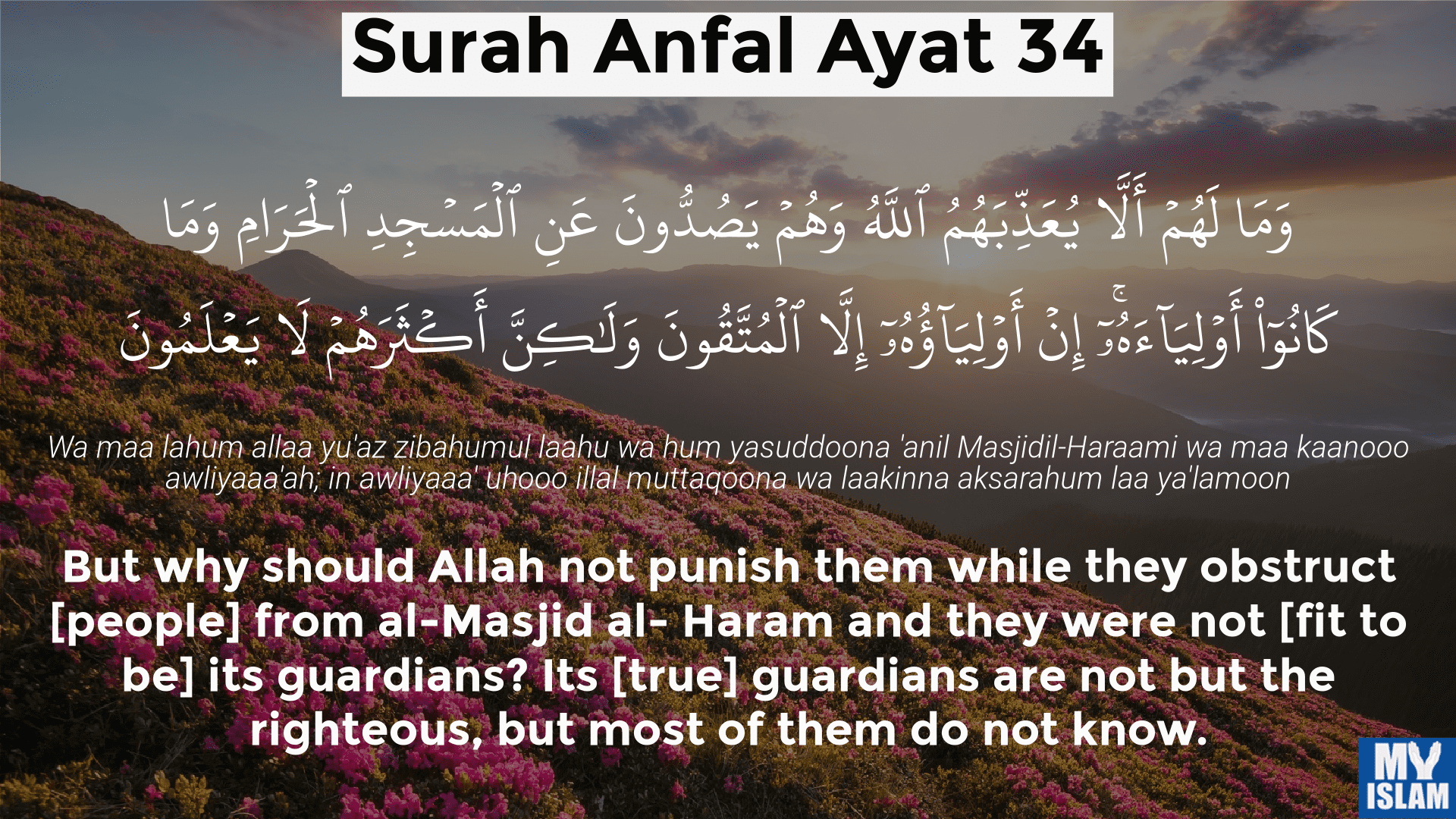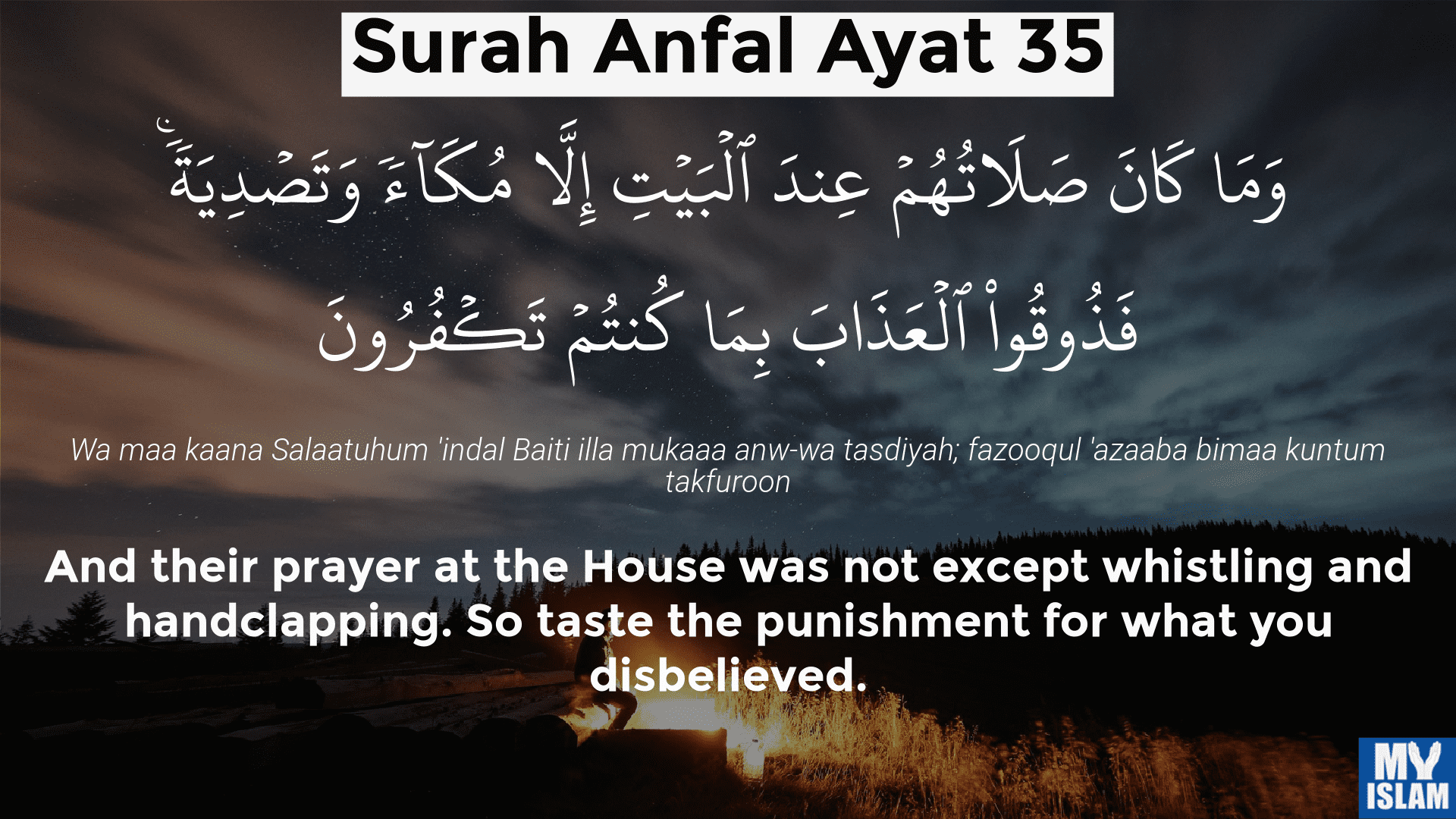Surah Al-Anfal Ayat 34 in Arabic Text
English Translation
Here you can read various translations of verse 34
But why should Allah not punish them while they obstruct [people] from al-Masjid al- Haram and they were not [fit to be] its guardians? Its [true] guardians are not but the righteous, but most of them do not know.
But what plea have they that Allah should not punish them, when they keep out (men) from the sacred Mosque – and they are not its guardians? No men can be its guardians except the righteous; but most of them do not understand.
But what prevents Allah from chastising them now when they are hindering people from the Holy Mosque, even though they are not even its true guardians. For its true guardians are none but the God-fearing, though most of them do not know that.
And why should not Allah punish them while they stop (men) from Al-Masjid-al-Haram, and they are not its guardians? None can be its guardian except Al-Muttaqun (the pious – see V. 2:2), but most of them know not.
What (plea) have they that Allah should not punish them, when they debar (His servants) from the Inviolable Place of Worship, though they are not its fitting guardians. Its fitting guardians are those only who keep their duty to Allah. But most of them know not.
And what (plea) have they, that Allah should not torment them, and they are barring from the Inviolable Mosque, and in no way have they been its patrons? Decidedly none (could be) its patrons except the pious ones; but most of them do not know.
yet why should God not punish them when they debar people from the Sacred Mosque, although they are not its [rightful] guardians? Only those mindful of God are its rightful guardians, but most of the disbelievers do not realize this.
اور ان میں کیا بات ہے کہ ان کو اللہ تعالیٰ سزا نہ دے حاﻻنکہ وه لوگ مسجد حرام سے روکتے ہیں، جب کہ وه لوگ اس مسجد کے متولی نہیں۔ اس کے متولی تو سوا متقیوں کے اور اشخاص نہیں، لیکن ان میں اکثر لوگ علم نہیں رکھتے
Quran 8 Verse 34 Explanation
For those looking for commentary to help with the understanding of Surah Al-Anfal ayat 34, we’ve provided two Tafseer works below. The first is the tafseer of Abul Ala Maududi, the second is of Ibn Kathir.
Ala-Maududi
(8:34) But what prevents Allah from chastising them now when they are hindering people from the Holy Mosque, even though they are not even its true guardians. For its true guardians are none but the God-fearing, though most of them do not know that.
There is no commentary by Abul Maududi available for this verse.
Ibn-Kathir
34. And why should not Allah punish them while they hinder (men) from Al-Masjid Al-Haram, and they are not its guardians None can be its guardians except those who have Taqwa, but most of them know not. 35. Their Salah at the House was nothing but Muka’ and Tasdiyah. Therefore taste the punishment because you used to disbelieve.
Allah states that the idolators deserved the torment, but He did not torment them in honor of the Prophet residing among them. After Allah allowed the Prophet to migrate away from them, He sent His torment upon them on the day of Badr. During that battle, the chief pagans were killed, or captured. Allah also directed them to seek forgiveness for the sins, Shirk and wickedness they indulged in. If it was not for the fact that there were some weak Muslims living among the Makkan pagans, those Muslims who invoked Allah for His forgiveness, Allah would have sent down to them the torment that could never be averted. Allah did not do that on account of the weak, ill-treated, and oppressed believers living among them, as He reiterated about the day at Al-Hudaybiyyah,
(They are the ones who disbelieved and hindered you from Al-Masjid Al-Haram (at Makkah) and detained the sacrificial animals from reaching their place of sacrifice. Had there not been believing men and believing women whom you did not know, that you may kill them and on whose account a sin would have been committed by you without (your) knowledge, that Allah might bring into His mercy whom He wills if they (the believers and the disbelievers) had been apart, We verily, would have punished those of them who disbelieved with painful torment.) ﴿48:25﴾
Allah said here,
(And why should not Allah punish them while they hinder (men) from Al-Masjid Al-Haram, and they are not its guardians None can be its guardians except those who have Taqwa, but most of them know not.)
Allah asks, `why would not He torment them while they are stopping Muslims from going to Al-Masjid Al-Haram, thus hindering the believers, its own people, from praying and performing Tawaf in it’ Allah said,
T(And they are not its guardians None can be its guardians except those who have Taqwa,) meaning, the Prophet and his Companions are the true dwellers (or worthy maintainers) of Al-Masjid Al-Haram, not the pagans. Allah said in other Ayah,
(It is not for the polytheists, to maintain the Masjids of Allah, while they witness disbelief against themselves. The works of such are in vain and in the Fire shall they abide. The Masjids of Allah shall be maintained only by those who believe in Allah and the Last Day; perform the Salah, and give the Zakah and fear none but Allah. It is they who are on true guidance.) ﴿9:17-18﴾, and,
(But a greater (transgression) with Allah is to prevent mankind from following the way of Allah, to disbelieve in Him, to prevent access to Al-Masjid Al-Haram (at Makkah), and to drive out its inhabitants,) ﴿2:217﴾.
`Urwah, As-Suddi and Muhammad bin Ishaq said that Allah’s statement,
(None can be its guardians except those who have Taqwa,) refers to Muhammad and his Companions, may Allah be pleased with them all. Mujahid explained that this Ayah is about the Mujahidin ﴿in Allah’s cause﴾, whomever and wherever they may be.
Allah then mentioned the practice of the pagans next to Al-Masjid Al-Haram and the respect they observed in its vicinity,
(Their Salah (prayer) at the House was nothing but Muka’ and Tasdiyah. )
`Abdullah bin `Umar, Ibn `Abbas, Mujahid, `Ikrimah, Sa`id bin Jubayr, Abu Raja’ Al-Utardi, Muhammad bin Ka`b Al-Qurazi, Hujr bin `Anbas, Nubayt bin Sharit, Qatadah and `Abdur-Rahman bin Zayd bin Aslam said that this part of the Ayah refers to whistling. Mujahid added that the pagans used to place their fingers in their mouth (while whistling). Sa`id bin Jubayr said that Ibn `Abbas commented on Allah’s statement,
(Their Salat at the House was nothing but Muka’ and Tasdiyah.)
“The Quraysh used to perform Tawaf (encircling the Ka`bah) while naked, whistling and clapping their hands, for Muka’ means `whistling’, while, Tasdiyah means `clapping the hands.”’ This meaning was also reported from Ibn `Abbas, by `Ali bin Abi Talhah and Al-`Awfi. Similar was recorded from Ibn `Umar, Mujahid, Muhammad bin Ka`b, Abu Salamah bin `Abdur-Rahman, Ad-Dahhak, Qatadah, `Atiyyah Al-`Awfi, Hujr bin `Anbas and Ibn Abza. Ibn Jarir recorded that Ibn `Umar explained the Ayah,
(Their Salat at the House was nothing but Muka’ and Tasdiyah.) “Muka’ means `whistling’, while, `Tasdiyah’ means `clapping the hands.”’ Sa`id bin Jubayr and `Abdur-Rahman bin Zayd said that,
(and Tasdiyah), means, they hindered from the path of Allah, the Exalted and Most Honored. Allah said,
(Therefore taste the punishment because you used to disbelieve.)
This refers to the death and capture that they suffered during the battle of Badr, according to Ad-Dahhak, Ibn Jurayj and Muhammad bin Ishaq.
Quick navigation links






